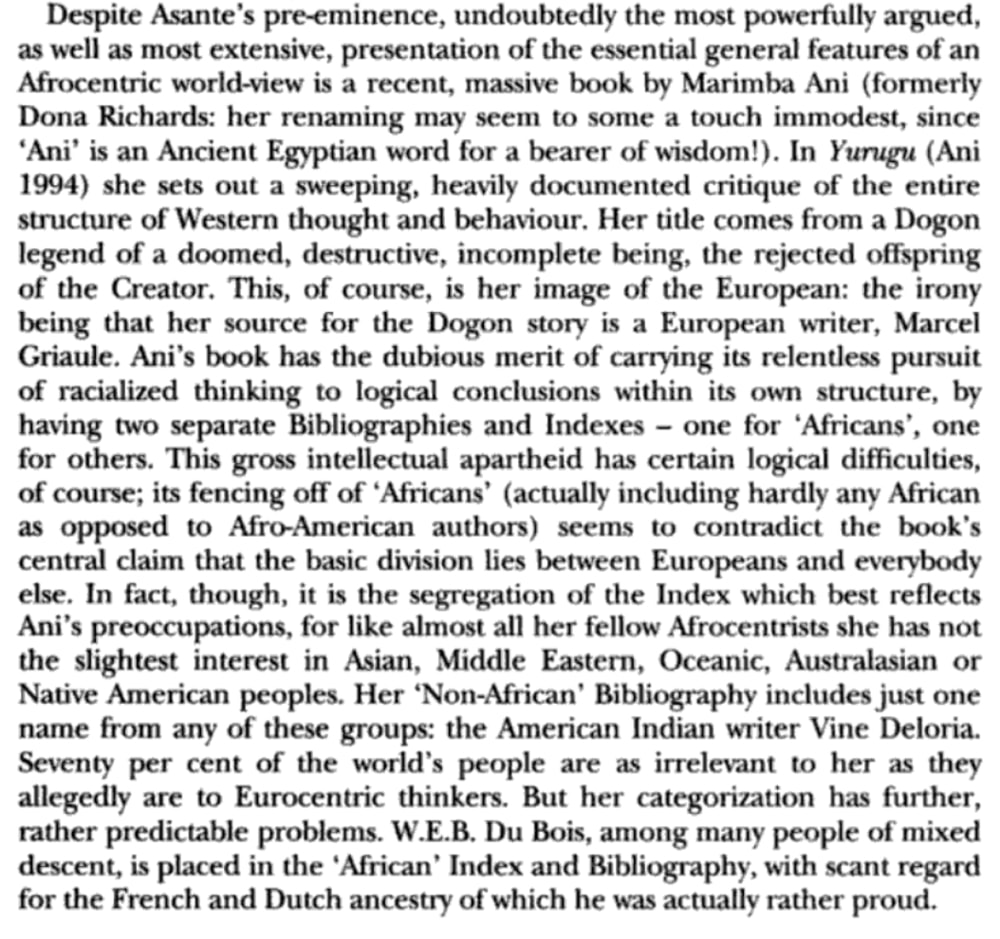Book: "Yurugu: An African-Centered Critique of European Cultural Thought and Behavior" (1994) (PDF) - by Marimba Ani
“Your culture is your Immune system” - Marimba Ani
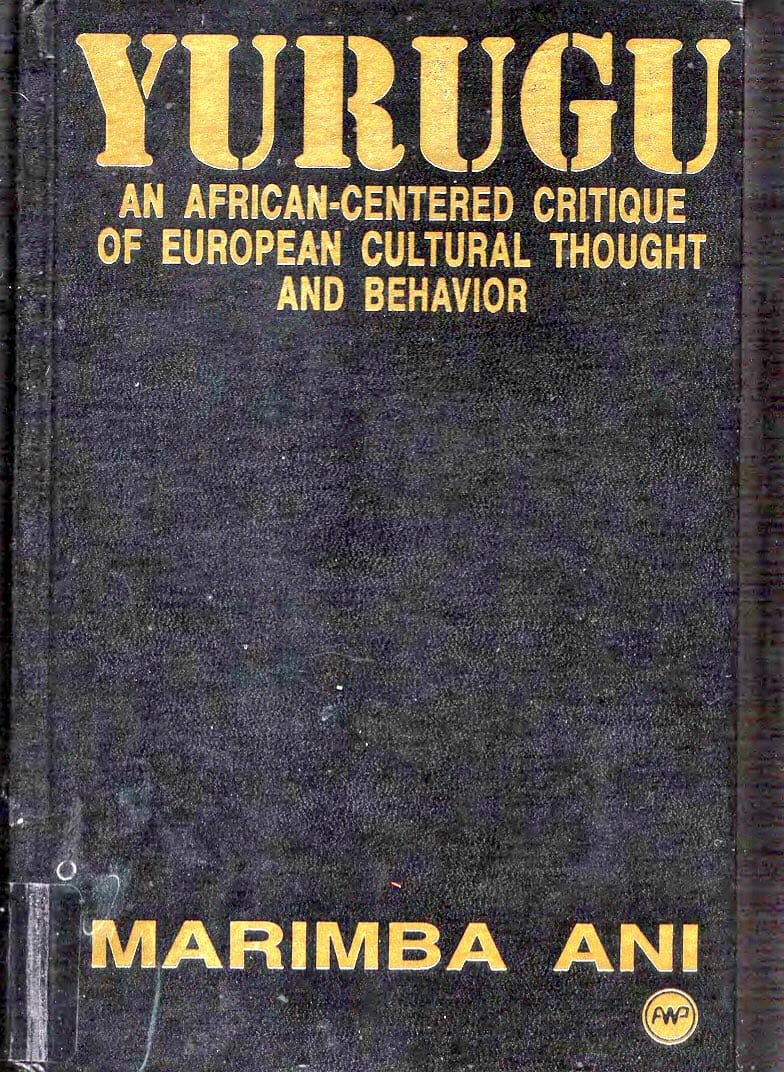
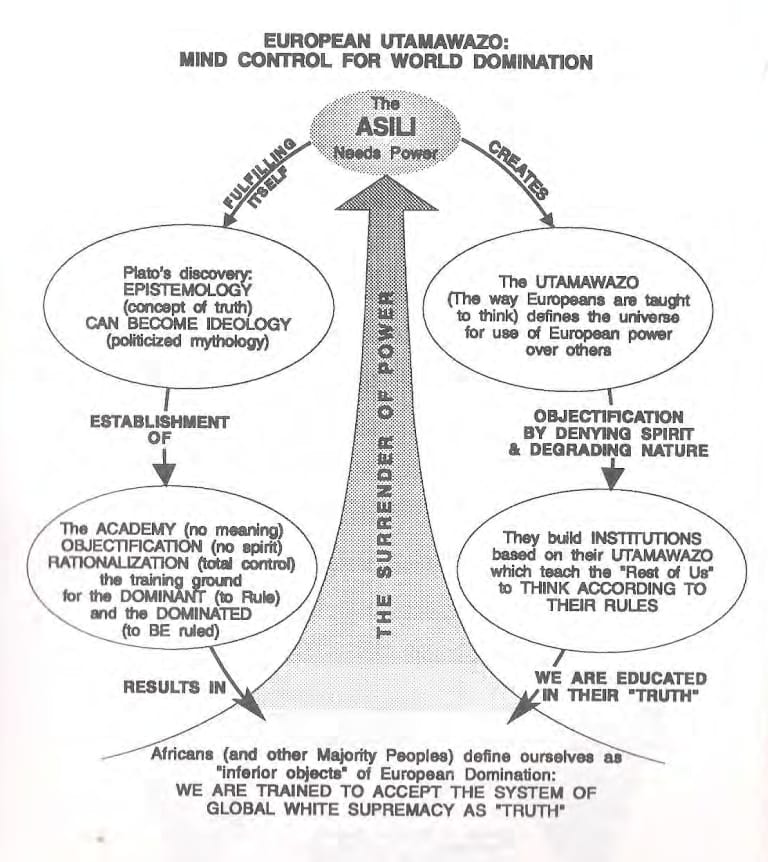
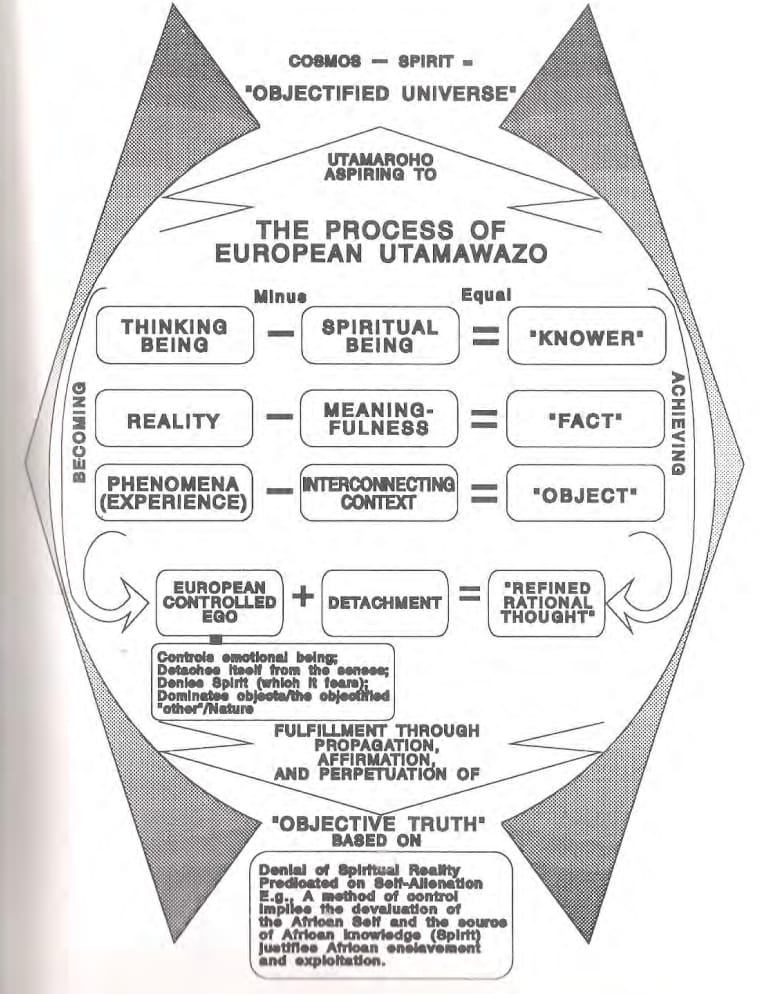
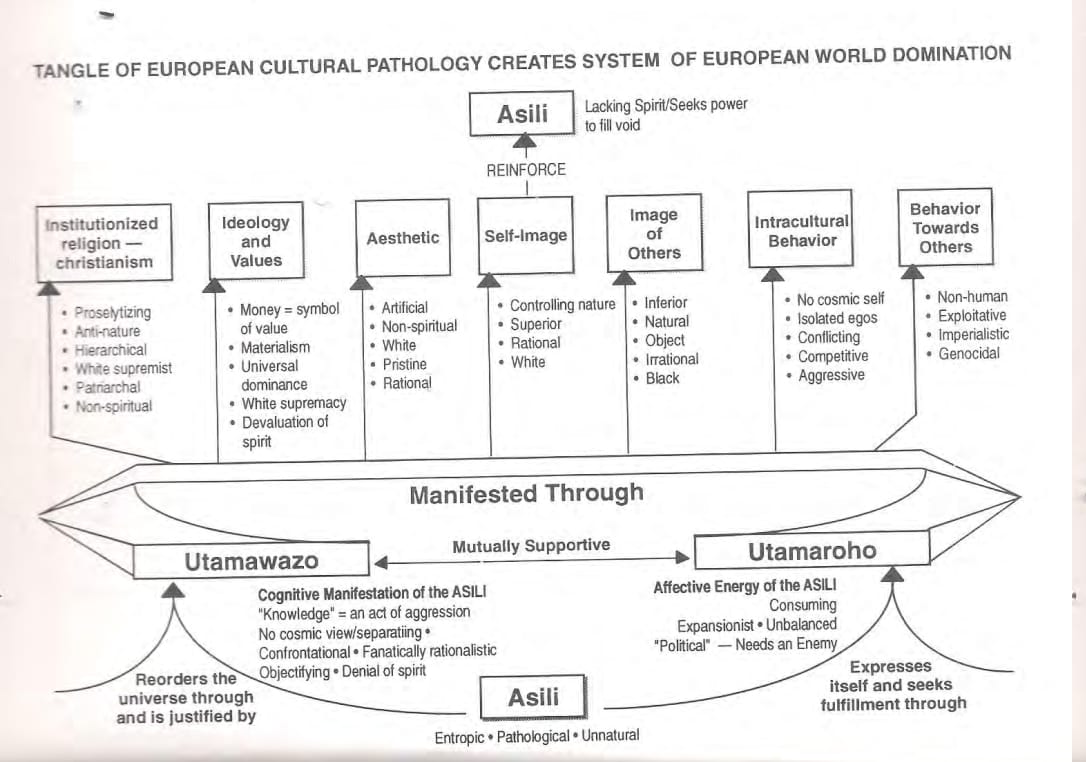
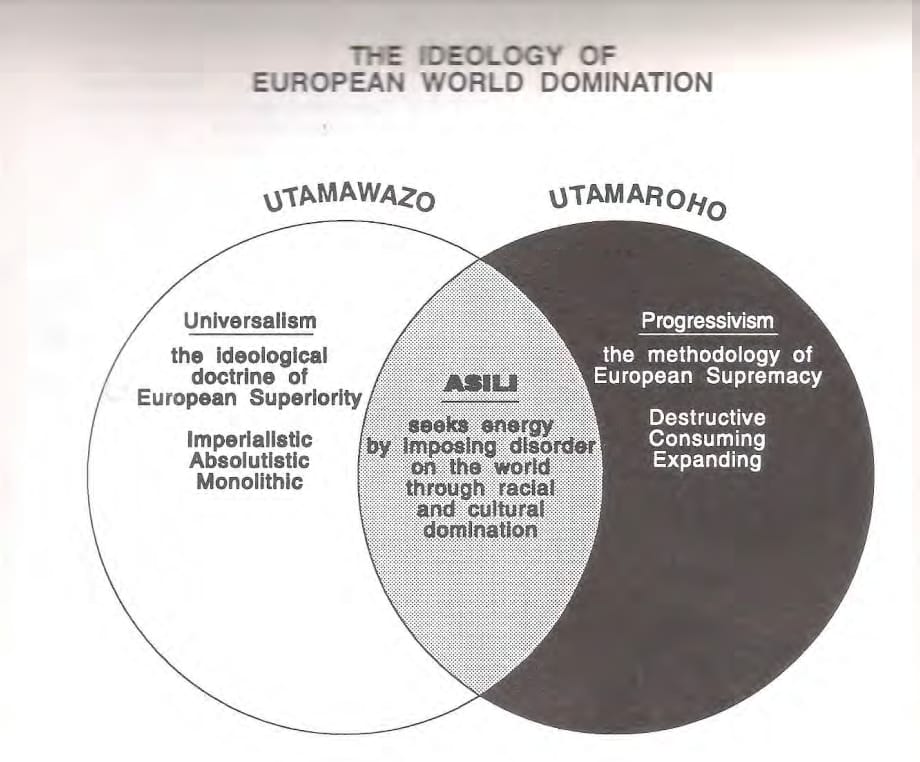
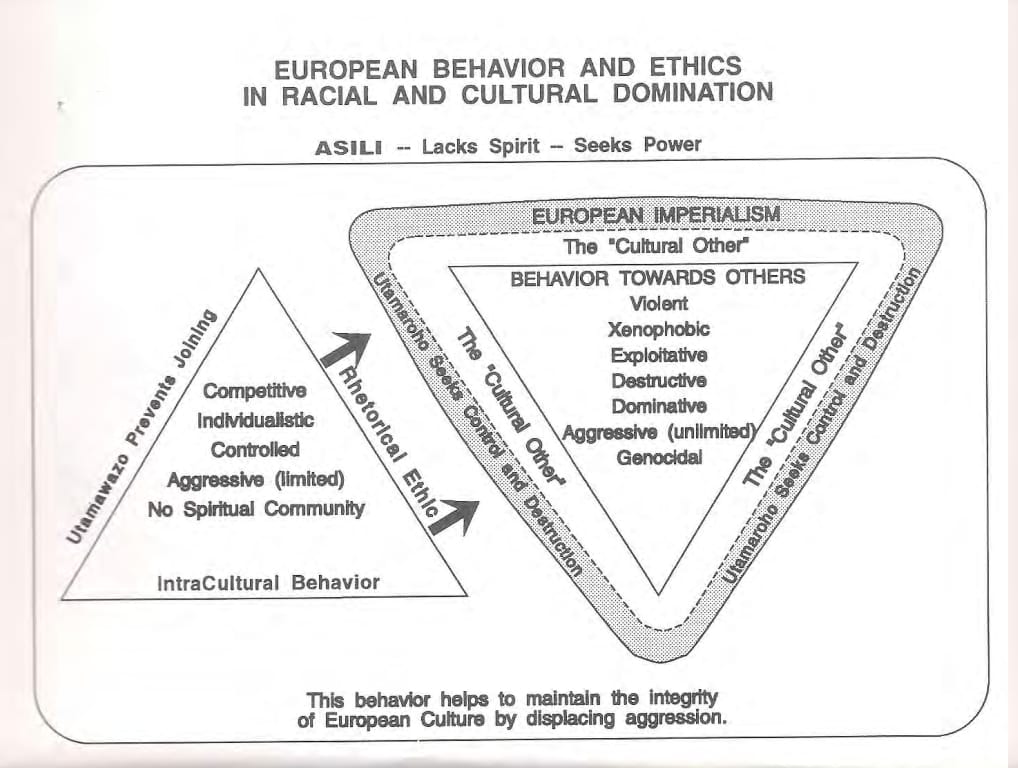
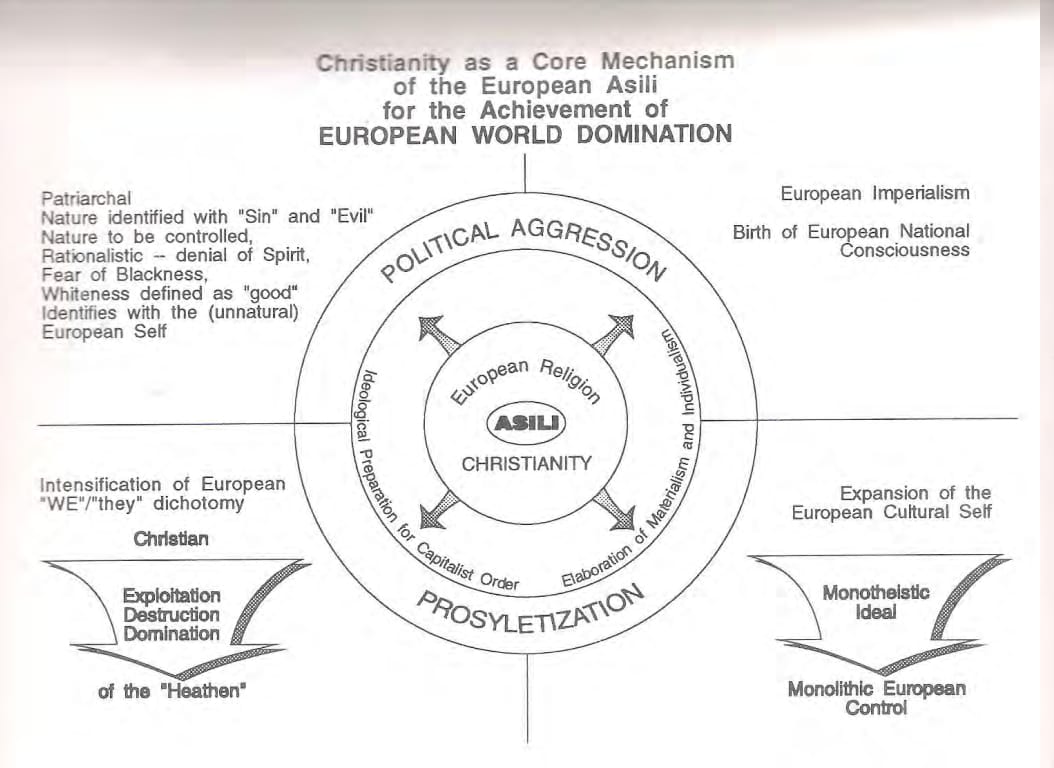
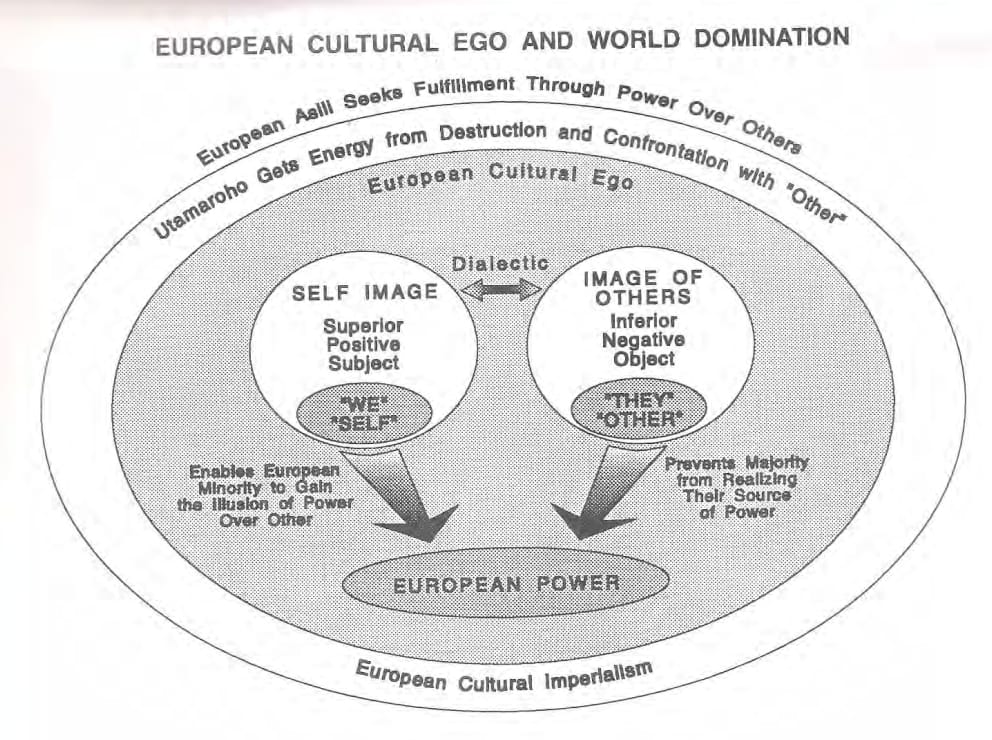
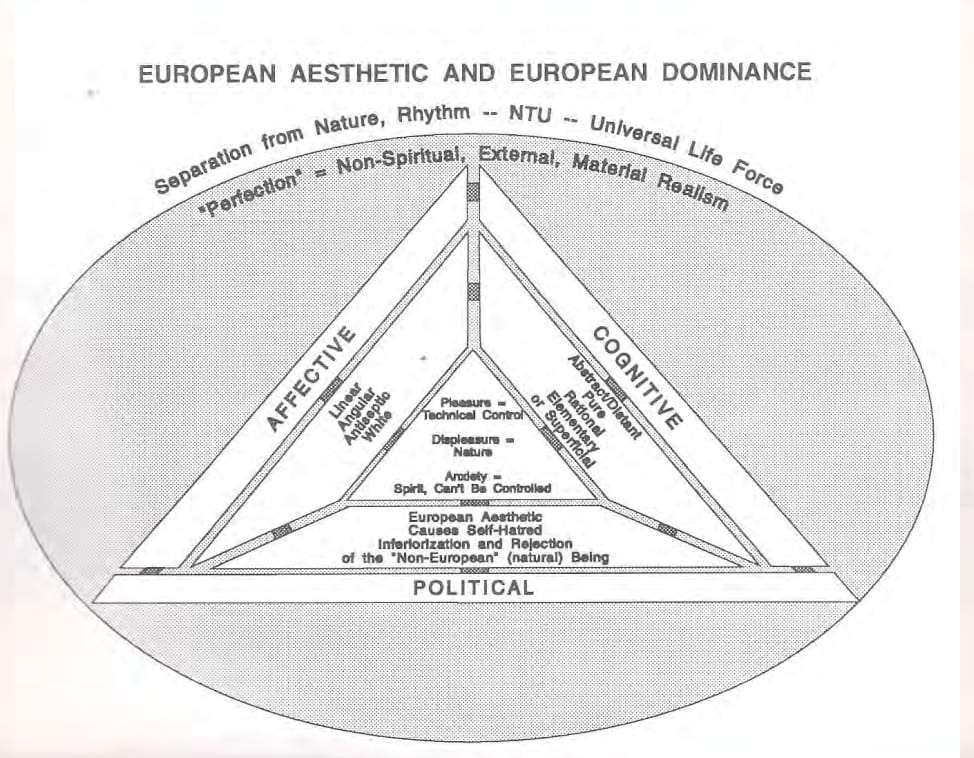
Yurugu: A very brief summary
Ani's 1994 work, Yurugu: An Afrikan-Centered Critique of European Cultural Thought and Behavior, examined the influence of European culture on the formation of modern institutional frameworks, through colonialism and imperialism, from an African perspective. Described by the author as an "intentionally aggressive polemic", the book derives its title from a Dogon legend of an incomplete and destructive being rejected by its creator.
Yurugu, described in Dogon mythology, by the people of Mali, in West Africa, as incomplete, in search of the secrets of AMMA (the creative principle) of which he wants to “gain possession.” Acting with anxiety and impatience, and aggressiveness, he is incessantly restless. Yurugu is responsible for disorder in the universe. This being conceived in denial of the natural order, then acts to initiate and promote disharmony in the universe. In African Cosmology such a being is deficient in spiritual sensibility, is perpetually in conflict, is limited cognitively, and is threatening to the well being of humanity.
Examining the causes of global white supremacy, Ani argued that European thought implicitly believes in its own superiority, stating: "European culture is unique in the assertion of political interest". In Yurugu, Ani proposed a tripartite conceptualization of culture, based on the concepts of:
- Asili, the central seed or "germinating matrix" of a culture, it's essence.
- Utamawazo, "culturally structured thought" or worldview, "the way in which the thought of members of a culture must be patterned if the asili is to be fulfilled", and
- Utamaroho, a culture's "vital force" or "energy source", which "gives it its emotional tone and motivates the collective behavior of its members".
The terms Ani uses in this framework are based on Swahili. Asili is a common Swahili word meaning "origin" or "essence"; utamawazo and utamaroho are neologisms created by Ani, based on the Swahili words utamaduni ("civilisation"), wazo ("thought") and roho ("spirit life"). The utamawazo and utamaroho are not viewed as separate from the asili, but as its manifestations, which are "born out of the asili and, in turn, affirm it."
Ani characterised the asili of European culture as dominated by the concepts of separation and control, with separation establishing dichotomies like "man" and "nature", "the European" and "the other", "thought" and "emotion" – separations that in effect end up negating the existence of "the other", who or which becomes subservient to the needs of (European) man. Control is disguised in universalism as in reality "the use of abstract 'universal' formulations in the European experience has been to control people, to impress them, and to intimidate them."
According to Ani's model, the utamawazo of European culture "is structured by ideology and bio-cultural experience", and its utamaroho or vital force is domination, reflected in all European-based structures and the imposition of Western values and civilisation on peoples around the world, destroying cultures and languages in the name of progress.
The book also addresses the use of the term Maafa, based on a Swahili word meaning "great disaster", to describe slavery (or African Holocaust). African-centered thinkers have subsequently popularized and expanded on Ani's conceptualization. Citing both the centuries long history of slavery and more recent examples like the Tuskegee study, Ani argued that Europeans and white Americans have an "enormous capacity for the perpetration of physical violence against other cultures" that had resulted in "antihuman, genocidal" treatment of blacks.
Quotes by Marimba Ani
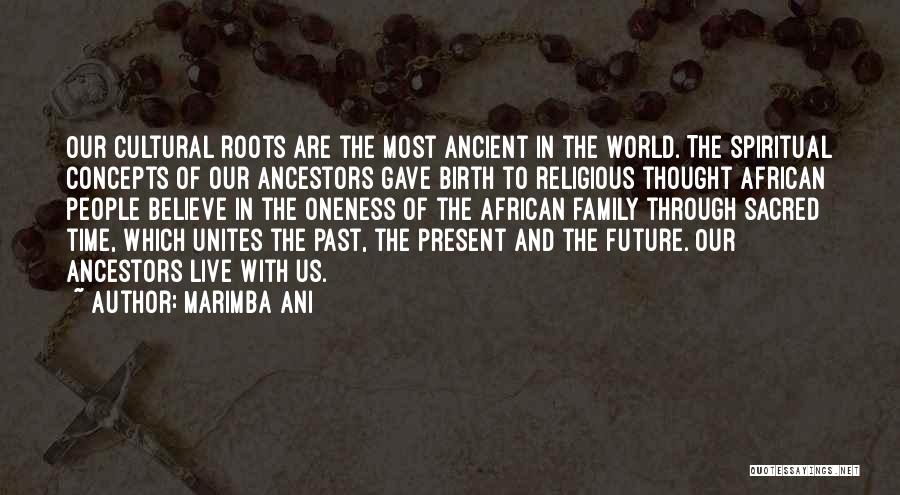
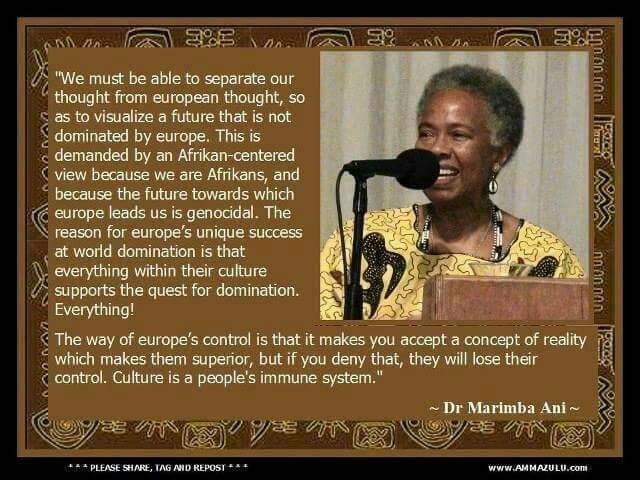

Intellectual “de-colonization” is a prerequisite for the creation of successful, political decolonization and cultural reconstruction strategies. The Caucasian’s (political) imperialistic success can be accredited, not so much to superior military might, as to the WEAPON of culture."
According to Plato’s epistemology, in order to be capable of critical thought, one must be, independent, from that to be know: uninvolved, detached, remote. What this allows for is CONTROL of the self, no longer able to be manipulated by context. A self without context – in African terms is a self without meaning, a “non-self.”
The concept of freedom has to do with the ability – lack of constraining forces – to do. This freedom is the existential prerequisite to individual power. Power, as a Caucasian concept, is the ability to control and to manipulate; control of the self, in order to control and manipulate objects external to the self. [...] The historically exploitative, aggressive, capacious, and selfish nature of Caucasian culture is the antithesis of the professed Christian virtues of “brotherhood, meekness, humility,” generosity and altruism. Capitalism demands the pursuit of one’s own interests. Capitalism is an economic system in which the goal of unlimited gain is linked to this concept of individual freedom and liberty. One must be “allowed” to be properly selfish; that is what it means to be “free.” Self-interest is paramount, and “freedom” is the ability to pursue this interest. One must be a “free agent” – free in the interest of self. [...] Western “democracy” is necessary to assuage the fear and distrust that individuals have of each other. Democracy is envisioned as the system that guarantees the “freedom” of the individual to do what they must on behalf of their own self-interest, which is the control of others.
The motivating factor underlying Caucasian cultural aggression is the power drive, which is fully acted out on the cultural other. Love and power, as they are understood in the West, are opposites. Love representing loss of self and therefore of control, while power demands control of self.
The growth of Caucasian world order was not impeded by passivity and love; rather it thrived on the intensely aggressive and hostile behavior that the asili of the culture encouraged.

Yurugu: A brief summary - by Marimba Ani (via)
Yurugu, described in Dogon mythology, by the people of Mali, in West Africa, as incomplete, in search of the secrets of AMMA (the creative principle) of which he wants to “gain possession.” Acting with anxiety and impatience, and aggressiveness, he is incessantly restless. Yurugu is responsible for disorder in the universe. This being conceived in denial of the natural order, then acts to initiate and promote disharmony in the universe. In African Cosmology such a being is deficient in spiritual sensibility, is perpetually in conflict, is limited cognitively, and is threatening to the well being of humanity.
AMMA, the Creator, ordained that all created beings should be living manifestations of the fundamental universal principle of complementary or “twin-ness.” This principle manifests itself as the wholeness which is created when female and male pairs join in all things. Such establishes equilibrium, cooperation, balance, and harmony. AMMA therefore equipped each being with twin souls – both female and male at birth.
But in one of these primordial placentas, the male SOUL did not wait for the full gestation period to be born. This male being known as Yurugu, arrogantly wished to compete with AMMA and to create a world better than that, which AMMA created.
With his fragmented placenta he created Earth; but it was imperfect, since he was incomplete, born prematurely, without his female twin-soul. The Earth, he had defiled in the act of self-creation, was now inhabited by single-SOUL, incomplete beings like himself. Yurugu’s descendants, all eternally deficient, originated in an incestuous act, since he had procreated with his own placenta, the representation of his mother.
Realizing he was flawed and deficient, Yurugu returned to AMMA, seeking his complementary female self. But AMMA had given his female SOUL away. Yurugu, forever incomplete, was doomed, “MARKED” from birth for failure, to perpetually search for completeness, his female principle, that could never be his.
***Introduction***
There is a “stultifying” intellectual mystification that prevents, the victims, of Caucasian colonization, from THINKING in a manner that leads to authentic self-determination. Intellectual “de-colonization” is a prerequisite for the creation of successful, political decolonization and cultural reconstruction strategies.
The Caucasian’s (political) imperialistic success can be accredited, not so much to superior military might, as to the WEAPON of culture.
Cultural supremism is, the systematic imposition of an alien culture in the attempt to destroy the will of a politically dominated people. The mechanism of cultural supremism causes cultural insecurity and self doubt within the dominated group. Separated from their ancestral legacy they lose access to their source of political resistance.
To be truly liberated, non-white (black, brown, red, yellow) people must come to KNOW the nature of Caucasian thought and behavior, in order to understand the EFFECT that whites have had on our ability to THINK victoriously. Non-white people must be able to separate our thought, from Caucasian thought, so as to visualize a future that is not dominated by them. This is demanded because the FUTURE, towards which Caucasians lead us, is genocidal.
Ultimately the liberation of the thinking of Non-white people, from its colonized condition will require the creation of a new language.
***SECTION 1: Concepts and Terms***
—A THEORY OF CULTURE—
In all cultures there is the “taken-for-granted,” assumed, and habitual aspect that though generally less visible than others, and rarely explicit – exerts the most profound effect on its members. It is precisely because these “hidden controls” functions on such a deep level, that they become habitual responses that are experienced “as though they were innate.”
***SECTION 1: Concepts and Terms Cont.***
—A THEORY OF CULTURE Cont.—
Culture “teaches” its “logic” and “world-view” to the ordinary participants, who assimilate it, assume it, and push it BENEATH the SURFACE, from where it influences their COLLECTIVE BEHAVIOR and response.
Culture, as a “norm”-a-tive structure, concerns standards of desirability – values. “Norms” are rules of conduct, that, specify what should and should not be done. The “norm”-a-tive aspects of culture, combine to form a “set of guidelines” by which people regulate their own behavior and that of their fellows.
“Values” and “norms” can only be supported or positively “sanctioned” within a culture in such a way that behavior that conforms to them is “rewarded” – meets with “success” and “approval.” While behavior that contradicts them is “punished” – results in “failure” and is “put-down” by one’s fellows, or is simply not rewarded in any way, is not recognized as “valued” behavior.
“World-view” is that aspect of culture that, functions to replace presented chaos with perceived order, by supplying the members of a culture with definitions of reality, with which to make sense of their surroundings and experiences. It is the meaningful organization of experience, the “assumed structure of reality.” This “deep structure” of culture, has a most powerful influence on the shape of the culture and the thought-patterns of its members.
Then “special” members of the culture, regarded as “intellectuals, scholars, theorist,” retrieve the assumptions of this world-view and re-present them as tenets of a universal system of thought, one that presents standards of logic, rationality, and truth to the world.
These “intellectuals and scholars” are considered the “theorist” of the culture, when actually, their ideas, simply reflect the assumed reality of the mainstream culture. But the manner of their “presentation” is authoritative.
In this way the Caucasian world-view takes on ideological force not only within, but OUTSIDE the culture, since it can be imposed as universal, speculative and self-CONSCIOUS.
—Asili—
The concept of “Asili” – a Kiswahili word, is used in several related ways to mean: beginning, origin, source, nature, essence, fundamental initiating principle, germ – is introduced. The introduction of this concept implies a theory of culture.
Asili, as a conceptual tool for cultural analysis, refers to the explanatory principle of a culture. It is the germinal principle of the being of a culture, its essence.
Asili is the logos of a culture, within which its various aspects cohere. It is the developmental germ/seed of a culture. It is the cultural essence, the ideological core, the matrix of a cultural entity which must be identified in order to make sense of the collective creations of its members.
The Asili is like a template that carries within it the pattern or archetypical model for cultural development. It embodies the “logic” of the culture. The logic of a culture, is an explanation of how it works, as well as, the principle of its development.
The Asili generates systematic development – it is a statement of the logos. The Asili of a culture is formulative, it is ideological in that it gives direction to development. Asili in its ideological focus, is concerned with that which compels and demands particular forms and content of expression.
Asili allows us to recognize culture as a basic organizing mechanism that forges a group of people into an “interest group,” an ideological unit.
Asili accounts for consistency and pattern in culture, also its tenacity. The Asili determines cultural development, the form that the culture takes; how the culture acts to maintain the integrity of the Asili.
Every culture has an Asili, determined by the collective, fundamental nature of its members. The Asili of a particular culture can be identified and its inherent nature delineated. This presents us with a powerful tool of explanation, since we have a concept that helps to explain the organicity, structure, and development of any culture. Asili accounts for the driving force of a culture, telling us “what makes the culture it tick.”
Asili is a synthesizing concept, it allows us to explain and to see the way in which the various aspect of a culture relate and cohere. This critical relationship takes place within the ideological matrix of the culture, the Asili.
The Asili is the reference point and center – explaining cultural phenomenon within the context of a specific cultural tradition.
Asili, enables us to understand and explain the behavior, thought, and creations of a people in terms of the origin and logic of their culture. It enables us to understand Caucasian thought and behavior as being part of an ideological whole. Caucasian culture becomes explicable as an ideological totality.
Asili is a force, an energy that asserts itself by giving direction to and placing limits on cultural creativity. Asili is the primary determinative factor of cultural development and an essential explanatory principle of cultural theory.
Asili does not imply its own cause – what caused the Asili to come into being.
—Utamaroho—
Two other concepts, to complement the Asili concept, are, U-tam-a-wazo. The concept of “U-tam-a-wazo” is created from the Kiswahili terms:
“U-tam-a-du-ni,” which means: civilization or culture; and “Wazo,” which means: thought; and “Ro-ho,” which means: spirit-life.
So “u-tam-a-roho” is defined as the “spirit-life of a culture,” the collective personality of its members. Utamaroho, like ethos, accounts for: attitude, character, and “aesthetic” in a collective sense. Utamaroho, as collective personality is not self conscious. Utamaroho remains on an UNCONSCIOUS level of feeling. It is affective.
A culture, or group of people possess an immaterial (nonphysical) substance that determines their unique character or nature. We speak of utamaroho as we speak of temperament and character and emotional response. Utamaroho is not individual, it is collective.
Utamaroho focuses on the uniqueness of a particular culture with respect to its emotional rather than cognitive patterns.
Asili is the seed that produces a force. The force is the utamaroho of a people. Utamaroho is the inspirational source from which the utamawazo derives its form. It is the energy source for all of the culture’s collective forms.
“U-tam-a-ro-ho” is the vital force of a culture, set in motion by the Asili. It is the thrust or energy source of a culture; that which gives it its emotional tone and motivates the collective behavior of its members. Both the Utamawazo and the Utamaroho are born out of the Asili and, in turn, affirm it. They should not be thought of as distinct from the Asili but as its manifestations. The Utamaroho of a people is a force made powerful through its collectiveness.
Utamaroho, is not thought out or planned. It is an instinctive reaction caused by “spirit.” Spirit refers to the essential nature of a being. It denotes the way in which the Asili acts to forge a collective response among the members of a culture to life and to the world as they confront it.
Utamawazo conveys the idea of, THOUGHT, as determined by CULTURE. It focuses on the WAY, culture acts to determine, collective cognitive style. It refers to the THOUGHT PATTERNS of a group of people who are culturally related, in so far as these thought patterns are determined by the culture. Utamawazo is not simply thought, but forms of thought.
Utamawazo is culturally structured thought. It is the way in which cognition is determined by a cultural Asili. It is the way in which the thought of members of a culture must be patterned if the Asili is to be fulfilled.
Utamawazo stresses the significance of metaphysical assumptions and presuppositions about the nature of reality, and the way in which the culture presents its members with definitions and conceptions with which to order experience.
Utamawazo, places emphasis on conscious mental operations and refers to the way in which both speculative and non-speculative thought is structured by ideology and bio-cultural experience.
Utamawazo allows us to demonstrate the ideological consistency of the premises of the culture and to identify those premises as they tend to be standardized expressions of a single cultural entity.
Utamawazo focuses on “epistemological definitions” in the belief that as culture acts to fix definitions of truth, the culture constructs a universe of authorization that rejects and incorporates ideas with reference to a cultural predisposition in intent and style. It accounts for perspective.
“Epistemology,” is the division of philosophy that investigates the nature and origin of knowledge. It is a philosophical theory of the nature and origin of knowledge.
Can it be an accident that, the only people who have built an entire CULTURE based on the DOMINANCE of others, are also the only ones who are, Caucasian? NO, it is not coincidental that only Caucasians have based their CULTURE on dominance.
White supreme-ism, is a form of behavior that is SYSTEMATIC. Whites have constructed a SYSTEM of institutions, which depend on and encourage a particular PATTERN of BEHAVIOR towards non-whites, that is called “racist.” The behavior is lodged comfortably within the matrix of Caucasian CULTURE. White world supremacy is part of the definition of Caucasian ideology.
The functioning of culture as a synthetic whole requires the commitment of people, and that commitment requires the conviction that one way of life is right for them.
The inordinate power drive is lodged within the formulative and origination process of the CULTURE – this is the “Asili.”
The “utama-roho” that manifest an insatiable “will-to-power,” developed out of the “Asili” that demanded it.
***Section 2: Plato’s Epistemology***
Nietzsche enthusiastically embraces the “ideology of power” and his accurate interpretation of the power drive as the essential dominating force within Caucasian culture. “Life itself,” he says, “I regard as instinct for growth, for continuance, for accumulation of forces, for power: where the will to power is wanting there is decline.”
Any discussion of the nature and origin of Caucasian epistemology (philosophical theory of the nature and origin of knowledge) must focus on, if not begin, with Plato. Plato’s influence on the Caucasian style of speculative thought and ultimately on the utamawazo – the general premises and assumptions of the culture – has been formulative.
Plato had to argue for the supremacy of his epistemology, his philosophical theory of the nature and origin of knowledge, fighting against the Sophists of his time, the powerful ancient mystery systems of ancient Kemetic (Egyptian) science, philosophy, religion, and other philosophical and ideological possibilities, a long time ago, when Europe was not even in its infancy.
Twenty-five thousand (2500) years after Plato’s concepts were introduced as “new,” “radical” and “revolutionary” to the Greeks, they are now part of the “taken-for-granted,” underlying, pre-suppositional foundation of Caucasian scholarly thought and cognitive aspects (utamawazo) of its world culture as a whole.
The Platonic epistemological mode (utamawazo) put archaic Caucasian culture on the right track, towards successful imperialistic expansion by establishing the intellectual confines of that ideology.
Platonic theory and epistemology and its subsequent development, en-culturation, and reformulation, provided the most effective, ideological underpinning for, politically and culturally aggressive and imperialistic behavior patterns, on the part of Caucasians, precisely because the argument was stated in INTELLECTUAL and academic “scientific” terms.
Plato, not only helped to, establish a theory of the human that would valorize “scientific” cognition, to the exclusion of other cognitive modes, but he established the Academy (university/college).
A characteristic assumption of Caucasian culture is that, association with “academia” (university/college), represents association with truth, superior reasoning capacity, impartiality or “objectivity” and a commitment to nothing other than, the supposed, “abstract truth.”
The Caucasian “cognitive style” (u-tam-a-waz-o) became an extension of Plato-ism. Not only all Caucasian intellectuals, but ALL intellectuals would be trained in the Caucasian Academy (Plato’s legacy). A testament to the success of white cultural supremism/imperialism.
The mode of the academy is still at the base of social control. The Academy (university/college) has preserved a cultural tradition, of a race of people, and a dominant society. The Academy ensures that the ideological intra-structure will remain intact.
Plato was, very much, aware of himself as a social and ideological architect. Plato set the mold for a method of thinking, discourse, argumentation, and organization that would guarantee social control by people (men) like himself. His genius was in understanding that to do this successfully he had to influence the style of thought, language, and behavior of all human beings, their total experience.
Plato laid a rigorously constructed foundation for the repudiation of the symbolic sense – the denial of cosmic, intuitive knowledge.
Plato’s “Republic” is the paramount guide to activity, in an endless approach to supposed perfection.
Plato’s “Republic” is his, ideological justification of, the State, he wishes to bring into being – as the creation of the OBJECT.
Plato established a dogma that, not only discredited other epistemologies – philosophical theories of the nature and origin of knowledge – it established a hierarchy, in which, certain kinds of people – the worlds majority of Non-white – were inferior.
Plato’s epistemology became the foundation for a form of social organization that would facilitate, world DOMINATION of the many (Non-white), by the FEW (white).
Plato’s epistemology became the assumptions of white world cultural tradition, these assumptions, translated into an ideological tradition of the civilization.
***Section 4: OBJECTIFICATION***
A cognitive modality, which designates, everything, other than the SELF, as OBJECT. This process mandates a de-spiritualized, isolated EGO, and facilitates the use of knowledge as, CONTROL and power over the OTHER.
The creation of the OBJECT, requires a transformation of the universe – no longer experienced but rather, “objectified.” Plato performs this feat in the “Republic” – a psycho-intellectual maneuver by which the SUBJECT is able to separate the self, from the known. This SEPARATION, is the KEY that, LOCKS the door to, the possibilities of the apprehension of a SPIRITUAL universe.
The psyche undergoes a transformation. The Greek word “psyche” indicates an understanding of an “autonomous self,” distinct from everything surrounding the self. The self is no longer a cosmic being, instead it becomes “the thinking subject.” The primary function of this self becomes the “knowing” and “thinking” of scientific activity, which is no longer connected to “intuiting,” the cosmic universe.
The assumption of cosmic interrelationship, forms a basis of communal relationships, as well as sympathetic relationship with the natural environment.
Plato’s “autonomous, thinking self or psyche” is a thing or entity capable of not only scientific cognition, but of moral decision.
For Plato, with rationality comes the power to make, moral decisions, and only this new “autonomous thinking self” could properly be the seat of moral decision.
Plato’s “thinking self” discarded other aspects of our “human” beingness as invalid or unworthy (unreal) and declared this super-conceptual function – this totally cerebral activity – as the essence of humanness.
This means that the SOUL became identified with “cognitive thought,” with “cold” calculation, with lack of emotion and a denial of feeling and sensation.
Plato’s theory of humanness successfully creates an illusion of the isolated self. This conception of the autonomous thinking self has locked the Caucasian into a narrow and limiting view of the human. A kind of spiritual retardation, in which painful isolation and alienation either incapacitates participants in the culture or makes them extremely efficient competitors, aggressors, and technocrats (technicians).
The way we create OBJECTS is by, totally detaching ourselves from what it is we wish to KNOW. By eliminating or gaining CONTROL of emotions, we become thinking SUBJECTS, distinct from the contemplated OBJECT. Through this separation, this remoteness, this denial of COSMIC RELATIONSHIP, OBJECTIFICATION is achieved.
This emotional distance from the OBJECT, is achieved by first and foremost, gaining control – by placing REASON (intellect) in control of emotions (feelings).
According to Plato’s epistemology, in order to be capable of critical thought, one must be, independent, from that to be know: uninvolved, detached, remote. What this allows for is CONTROL of the self, no longer able to be manipulated by context. A self without context – in African terms is a self without meaning, a “non-self.”
In Plato’s, “epistemology of objectification,” there is a separation between the SELF (subject) and the non-self (phenomenal world). The phenomenal world (non-self) – the totality of phenomena conceived as constituting the non-self – are the anti-thesis of SUBJECT, EGO, self-consciousness, becomes an OBJECT, an “it.”
The phenomenal world (non-self) becomes an, ENTITY (object), totally independent of the SELF (subject).
External reality – and conceptions formed in the mind itself – is to be apprehended.
Only the Platonic state of mind is equipped to deal with “knowledge,” because the mind has separated itself from the “object.”
This idea of CONTROL is facilitated by first, separating the human being into distinct compartments of “reason” and “appetite” or “emotion.” Reason is a higher principle or function, appetite is “more base.”
The cognitive self is split into that which controls – the conquering self, and that which is or should be controlled – the controllable other.
The key is CONTROL. Reason is positive, valued, “higher” – emotions are negative, devalued, “more base” because they have a tendency to control us. Such control is an indication of powerlessness. To understand the SELF as a COSMIC SPIRITUAL (emotional) BEING, is to be rendered, powerless, to the Caucasian..
SPIRITUALITY rest on the conception of a SACRED COSMOS that transcends physical reality, in terms of significance and meaning. Spirituality enables us to apprehend the SACRED in our natural, ordinary surroundings.
Spirituality is the recognition of spiritual connectedness, beyond lineal, ordinary, profane time. Spirituality is the apprehension of cosmic interrelationship; the apperception of meaning in existence; and the degree to which one is motivated by such meaning.
Spirituality is our ability to relate to the metaphysical levels of experience. It unites thought and feeling and thereby allows for intuitive understanding. This cognitive, affective sense is transmitted through collective relationship.
Spirituality, is a particular vision of a universal reality in which a given order underlies organic interrelationship of all beings within the resultant cosmos. This perceived order is, a matter of faith, is of a metaphysical-essentialist nature. It is on this ultimate, primordial level that meaning is derived, to explain material physical reality – spirituality is transcendent nature.
In spiritual conceptions while we function pragmatically within a profane reality, that “reality” is never thought to be the essence of meaning. In spiritual conceptions there is always a striving for the experience of a reality that joins all being. It allows for the apprehension of spirit (energy) in matter (form).
The SELF is conceived as a COSMIC SPIRITUAL BEING, a being that experiences itself as intimately involved with other beings in the cosmos. Cosmos refers to the universe as a unified, interrelated (organic) whole. A COSMIC SPIRITUAL SELF, cannot OBJECTIFY the universe.
Plato traveled widely and studied in various “mystery schools,” in Kemet (ancient Egypt), which were held in highest esteem. In the ancient Kemet conceptions, from which Plato learned, the universe was a cosmos, a harmoniously ordered whole. All phenomena were connected by a universal life-force, which made a unity of being.
When the Platonic mentality confronted the Kemet, esoteric, spiritualistic conception, it was rendered intellectualist, exoteric, and ideological.
The science of the cosmos, which later came to be known as alchemy, used mathematics, as a metaphorical expression and symbolic language that allowed the knowing person to participate in eternal truths.
For Plato, mathematical, geometrical proportions became the standard of beauty. The order had been reversed. Spirit was no longer primary, “creating symmetry and proportion” in the natural sphere, but symmetry and proportion were now used to impose a standard on the natural and on human conceptions. For Plato the geometrical form became a measure of perfection.
In the Platonic mentality the “object” is controlled by the mind that contemplates it. With this knowledge comes power, because the world could begin to be understood as being comprised of many such objects, capable of being manipulated by the knower, the knower who is aware of self, as knower and as being in complete control.
Unless the intellect is separated from the emotions – by controlling or eliminating the emotional relationship to a given situation, thing or person – it is not possible to talk about emotion distinctly, or concentrate on gaining knowledge.
To THINK PROPERLY – to achieve and be capable of scientific cognition – about an OBJECT, is to gain knowledge of (mastery and control over) an OBJECT.
Plato’s objectification is a cognitive modality which designates everything other than the “self” as object. This process mandates a de-spiritualized, isolated ego and facilitates the use of knowledge as control and power over other.
This results in the splitting of the human being. No longer whole, we become “mind vs. body.” The superiority of the intellect over the emotional self is established as, spirit is separated from matter.
This splitting of the human being facilitates the achievement of that supreme mental state (of being) in Caucasian culture, identified with the ability to “THINK.”
Plato’s “reason” is the denial of SPIRIT. Reason functions to control the more “base appetites” and “instincts.” For Plato, self-mastery, like justice in the State, is achieved when reason controls.
Plato described for Caucasians the “Ideal State,” in which the human being, who has gained control of self, controls those who haven’t.
Justice or the Good is achieved when the “best” controls the “worst.” In the State, the “highest” control, the “lowest.” The person is constantly at war with their own self and is not properly human until REASON, controls, emotion.
Plato indicates, the “higher” tendencies will always be “less” in number and the “lower” tendencies of greater mass. This rationalizes an ideology of CONTROL by, the FEW, within the State, and world DOMINANCE by a small white minority.
The mind is trained from birth to think in terms of dichotomies or “splits.” The splits become irreconcilable, antagonistic opposites. Holistic conceptions become almost impossible given this mind-set.
The mind is artificially split into conflicting faculties or tendencies – to think in terms of one faculty “winning” or controlling the others.
The process of VALUATION occurs in which one term is VALUED and the other is devalued. One is considered “good,” positive, superior; the other is considered “bad,” negative, inferior. Unlike the Eastern (Zen) conception of Yin and Yang – harmony is achieved through the balance of complementary forces – these contrasting terms are not conceived as complementary and necessary parts of a whole.
The members of a culture can VALUE one style of cognition over another. One will be emphasized and encouraged, while the other is not. A person will be rewarded for thinking in the valued mode, and such habits of thought will be reinforced in the formalized learning and socialization processes.
The process of “dichotomized perception” of reality, in the Caucasian utamawazo, is what the controlling imperialistic behavior depends upon. The utama-roho, which needs to control, is dependent on the antagonistic oppositions presented by the cognitive style – utamawazo- of the culture. Realities are split, then evaluated, so that one part is “better,” which mandates its controlling.
“Harmony” is RATIONAL order, an order based on the mechanism of CONTROL. Harmony is achieved when the “positive” term, CONTROLS (or destroys) the “negative” term: when reason controls emotion, both in the person and in the state.
The Platonic epistemology, which idealized objectification, enhanced the idea that, there was only one correct method of reaching truth, and that was via “logic.”
The idea of “logic” is presented as though it were a guarantee that conclusions would have absolute, verifiable truth. Anything else was mere opinion, subject to the shims of human nature. Logic helped one to maintain one’s “objectivity” (emotional distance).
Platonic epistemology allowed one to choose between the “logically and eternally true” and the “logically and eternally false.” Plato identifies the “logical” with the “eternal.”
The Platonic-influenced utamawazo provides the theoretical basis for a conceptual ethics – an ethical system – the themes of which are considered to be VALID, as long as they are consistent in terms of the logic of that system. What is “ethical” becomes what is “rational” and “logical.” The individual’s ability to act ethically is based on one’s ability to think “rationally” – “abstractly.”
Linear logic is only one aspect of our consciousness, one part of our cognitive apparatus, humans also have intuition. Deficient in “Intuition” – the ability to grasp cosmic reality, organic interrelationship – Caucasians were deprived of a different kind of power, which comes from JOINING.
***Section 5: Rational – Scientific Man***
When Plato described “justice” as the triumph of “reason” over “passion” in human beings, he was laying out a blue print for what he wanted the “men” of the Republic to become. Rationality helps to create a certain kind of person (“individual”).
Caucasian “rationalistic ideology” has created a particular kind of person who can be expected to behave in certain characteristic ways.
In Plato’s day there may have been only an inconsequential number of people “capable” of conceiving in this way. Now, whites are almost “born” with a concept of themselves as a, distinct psyche, isolated from all “others” and being responsible only to themselves.
The Platonic, “thinking-self” that exist separately and distinctly from the objects it encounters, enabled Caucasians to construct a rationalistic science.
Rationalistic science serves as the supremely valued activity, replacing “religion” (spiritual knowledge).
What is considered to be science and scientific method is regarded with the awe and humility that in other cultures represents the “religious attitude.”
“Scientific man” indicates a state of mind and of being: a way of looking at the world. Scientific man is “he” who approaches the universe with a particular attitude. Scientific man is above all logical, remote and detached.
Scientific knowledge is the ability to control, manipulate, and predict the movements of people and other “objects.
The desire for power – ever expanding control – is the basis of Caucasian culture, science, representing the epitome of rational control and manipulation to the Caucasian mind, becomes a primary means of power. Scientism is but its universalistic expression.
A scientific ideology was unavoidably attractive to the Caucasian mind. What they called “scientific truth” – a truth stripped of its human implications – could be imparted and absorbed “coldly” and rationally (“scientifically”). The extension of the scientific method in every aspect of human contemplation and experience was dictated by the Caucasian fear of the spiritual-emotional, which does not lead itself readily to manipulation and control. Objectification and the scientific method give the illusion of the kind of control and power that the Caucasian UTAMAROHO requires.
The Caucasian psyche needs the illusion of a rationally ordered universe in which everything can be known.
The supremacy of the rational mode requires that the human being be split into rational and irrational (emotional) tendencies. The rational self offers the possibility of knowledge (control), while the emotional self is a constant threat to the loss of control.
By controlling the emotions and dulling the senses, “it” (the ego) is able to project “itself” and to seek domination of others.
Rationalistic epistemology, requires that the “self” be split and that its emotional ground be denied. That which is denied represents precisely the aspects of the human SOUL that allow one “self” to join with another.
The “rational man,” is above all the person who is in control of his passions. He makes decisions – choices based on reason – the proper and invulnerable guide. Being in control of himself puts him in a better position to manipulate and control others – those who are irrational or less rational. He has power over others by virtue of his rationalism. Through the institutionalization and abstraction of the “rational” decision-making process – of which science is constituted – he believes that he can even control his destiny. He plans, predicts, and creates his future.
Other cultures are experienced as the emotional, uncontrolled self. It is “just” (“rational”) that inferiors should be conquered by superior beings.
This control of the emotions begins to imply the elimination of feeling. Whites learn to value unemotional behavior, by being cold, uninvolved, “rational” they gain respect, referred to as the achievement of “objectivity.”
Rationalism and its ascendance to the position of dominant cultural mode, dehumanizes humanity as it consciously de-spiritualizes the universe. De-spiritualization of the world denied whites the possibility of transcendence, of attaining a sense of the divine, an awareness of the sacred dimension, the experience of the eternal, to exceed the boundaries of a conceptually limited EGO.
The lack of identification with others was in Plato’s conception the primary rational act. The idea of “identification with,” love of, and sympathy or empathetic understanding for others goes against the grain of the Caucasian tradition; it is an epistemological, ideological, political, and spiritual contradiction. A morality based on “altruism” is inconceivable in the Caucasian context.
The universe transformed into lifeless matter, the supernatural is reduced to the natural, which means merely physical.
Spirituality represents a constant threat to the ordered system Caucasian have constructed.
Once the human spirit had been devalued as a DETERMINANT and inspiration of culture, the character of the culture itself began to move further and further in the direction of the DENIAL of that spirit.
This is the result of the de-sacralization of the universe by the Caucasian UTAMAWAZO and the arrogance that accompanies it.
Caucasian culture is a culture with, a non-spiritual ideological base. This essential and defining characteristic has allowed it to become the most materially successful culture, the most aggressively political culture, the most scientifically rational culture, and the most psycho-pathological culture the world has ever known.
It is at the same time the only culture that provides little source of spiritual or emotional well-being for its members, It carries little tradition of insight into the human spirit and virtually no knowledge of the human SOUL. It is atrophied toward nonhuman realities.
The Caucasian utamawazo – its intense rationalism, analysis, objectification, and lineality – all contribute to the illusion of intellectual power and the achievement of material power.
The Platonic emphasis, mandated the use of “objectification” as the essential mental “tool” of conceptual rationalism. Intense objectification is a prerequisite for the de-spiritualization of the universe, and through it the Caucasian/white “world” was made ready for ever increasing materialization.
Materialization begins with the separation of spirit and matter. This separation, results in the denial of spirit (de-spiritualization), the loss of meaning, and the loss of cosmos (inter-relationship).
But these mechanisms are breaking down since the essential problem of the Caucasian white world is spiritual, and demands another perspective on existence.
This mode of thought that has worked so well to produce the kind of technical and social order that Caucasian’s desire has also created a moral and spiritual disaster.
Caucasian culture presents the individual it produces with only the alternatives of materialism, scientism, and rationalism, but what the Caucasian needs is the inner peace that comes with COMMUNION (merging) with others, the sense of oneness, and emotional identification with other people.
Rational ordering becomes a sublimated form of violence. Rational order can never be more than a creation of human beings in partial recognition of who they are – in partial recognition of their cosmic significance. Rational order is the order of lesser beings, who can only experience a part of what is possible.
***Section 6: Universalism: The Syntax of Cultural Supremism (Imperialism)***
Non-whites must be able to recognize the phenomenon of Caucasian CULTURAL SUPREMISM, no matter what FORM it takes – the concepts that are used to “package” it.
Whites present their culture to the world, in universalistic terms. The most subtle and ideologically effective manifestation of white cultural supremism (imperialism) is the use of the semantics of “universalism” by whites. As people become more “rational,” they become more “universal.” The “Platonic Abstraction” represents the universal.
The struggle towards and search for the universal is, for whites, a movement towards the ontologically and epistemologically independent. The “whole” for Plato represents “being.” The “part” or partial is mere “becoming.”
“Otology,” is that branch of philosophy that deals with “being.” Epistemology meets with “ontology” as concepts of space and time begin to adhere in theories.
“Universalism,” is the critical ingredient of white cultural supremism / imperialism. Caucasian interest as the interest of all people. The small minority speaking for the overwhelming majority of the world.
Caucasians represent their culture by the term “civilization.” Civilization, becomes the “universally” valid cultural form created by rational human beings.
By camouflaging Caucasian political interest as “universal” human goals, whites disarm the victims of their imperialism.
The more successfully Caucasian culture is imposed on Non-white people, the more convincing becomes the rhetoric, until Non-white “intellectuals” (Caucasian trained), struggle also to represent not our own, but the “universal-humanitarian” interest – already defined in terms of Caucasian value. We find it “unintelligent” to talk in terms of “Race.”
White nationalism goes unrecognized while it spreads and destroys. That is the function of the “universal” in terms of white cultural supremism – imperialism.
The myth of “universalism” is what enables Caucasians to impose their definitions so successfully to convince their political objects that they are not Caucasian definitions, but that they are UNIVERSALLY valid definitions, which serve the benefit of humankind. Caucasian “definitions” are translated into “universalistic terms.
***Individuality, Freedom, and Self***
In the social order that the Caucasian asili generates, the self, becomes more spiritually separate, resulting in a collection of alienated selves.
Community can no longer be found in modern Western society, which is based on collectives that are functional to specialized ends.
The concept of individuality and freedom is prominent in the Caucasians own conception of the value and superiority of his culture.
The concept of freedom has to do with the ability – lack of constraining forces – to do. This freedom is the existential prerequisite to individual power.
Power, as a Caucasian concept, is the ability to control and to manipulate; control of the self, in order to control and manipulate objects external to the self.
It is this all important need to distinguish self from “other” (cognitively, emotionally, and politically) in its quest for power, on which the Caucasian utamaroho gives direction to white cultural nationalism.
This concept of power is synonymous with the Caucasian utamaroho, the most basic motivating force in the culture, touching every aspect of belief and behavior.
Inter-culturally, the entire culture bands together expertly in group effort to ensure its power over other cultures.
This idea of freedom in the Caucasian cultural psyche, has been handed down through various states of development of Caucasian collective consciousness.
The historically exploitative, aggressive, capacious, and selfish nature of Caucasian culture is the antithesis of the professed Christian virtues of “brotherhood, meekness, humility,” generosity and altruism. Capitalism demands the pursuit of one’s own interests. Capitalism is an economic system in which the goal of unlimited gain is linked to this concept of individual freedom and liberty.
One must be “allowed” to be properly selfish; that is what it means to be “free.” Self-interest is paramount, and “freedom” is the ability to pursue this interest. One must be a “free agent” – free in the interest of self.
The culture into which the Caucasian is born provides them with an individualistic and isolating concept of self, while it fails to provide them with a spiritual base of emotional inspiration and support.
A critical understanding of the European concept of self makes it possible to understand better the ideology of individualism and the related assumed value of human freedom.
The Caucasian “personality” is a by product of a conception of self that isolates the individual. They are alone and vulnerable, surrounded by other alone, vulnerable and defensive personalities.
Interpersonal behavior among white people is competitive, aggressive, exploitative, and based on, “survivalism”; made necessary by the nature of the culture itself. This behavior is, characterized by hostility and defensiveness.
Once past the level of the primary ideological substratum of the culture, which tends to bind Caucasian individuals together, there is no identification between them and other individuals within the culture.
Beyond this there is no commonality. He defines himself as their “opposite,” and his interest as “opposed to” or “in conflict with” theirs. “Meaning,” at the level of, secondary or derived values, is determined by the needs of survival among hostile beings.
With these given’s they have no choice but to go about the business of surviving as best they can. They are, indeed, in a “jungle.” An initially defensive posture soon becomes aggressively offensive behavior. The individual perceives that the best way to assure their own survival is to disarm others; to “beat” them, to “win,” to “get ahead,” to usurp the objects of value before they do, to control them. They must do all of these things before they are done to them.
That becomes the Golden Rule. The culture thrives on violence, and is becoming more intense.
The Western ethic is the epitome of selfishness. Contrary to the verbal expression of the rhetorical ethic, it is not considered immoral, in the West, to act in one’s own interest at the expense of the well being of others; rather, selfishness, competitiveness, exploitation of others are necessary for survival, dictated by the ideology of the culture, indicating, “moral” acceptable, encouraged behavior patterns.
Western “democracy” is necessary to assuage the fear and distrust that individuals have of each other.
Democracy is envisioned as the system that guarantees the “freedom” of the individual to do what they must on behalf of their own self-interest, which is the control of others.
These characteristics represent moral behavior in the context of Caucasian culture in that they are sanctioned by every aspect of the culture, and the individual within it is conditioned to manifest them.
***The Concept of – the “CULTURAL OTHER”***
The successful “culture-bearers” of “Western man” is the most competitive and aggressive person. While the least successful person in the culture, is characterized by humility and love.
In terms of Non-white ontological formulations the “person” has power or force by virtue of being “a part of” the cosmological whole.
A crucial aspect of the white supremist system/culture for understanding its imperialistic posture is the Caucasian conception of the “cultural other.” This conception helps to make Caucasian behavior towards others possible.
The cultural other is a conceptual, existential construct which allows whites to act out their most extreme aggression and destructiveness, while simultaneously limiting their collective self-destruction on a conscious level.
There is a significant distinction between Caucasian intra-cultural behavior and behavior towards “others.” Caucasian conceptions about these, two distinct behavior patterns, generate two distinct “ethical” systems.
The image of others, the “dialectical antithesis” of the Caucasian self image, helps to define the Caucasian self image. A negative conception of “other” is the basis upon which whites build their image of other peoples.
The “positive self-image” of the Caucasian is predicated on the degradation and demeaning of other peoples, on the support and persistence of a negative image of “others.”
The cultural other for the Caucasian belongs to a different ethnic persuasion, has a different racial origin. The “cultural other” is the “non-human” or the “not properly human.”
What allows whites to act as they do is a definition of non-whites as essentially nonhuman.
It is the ideological conceptual basis of Caucasian imperialistic behavior that the “cultural-other” be conceived of as “non-human.” This conception is mandated by the asili, which seeks power.
Thomas Jefferson said, “Black, whether originally a distinct race, or made distinct by time and circumstances, are inferior to the whites in the endowment of body and mind.*
The concept of “race” links CULTURE with the gene pool and color is one determining factor in a cultural identification, a definitive component in the Caucasian conception of the cultural OTHER.
“Racial” terms identify those who are “white” (Caucasian). These characteristics form a national and cultural ethnicity – a concept that combines the cultural-ideological and physical groupings of people.
The self-image of the Caucasian includes “whiteness,” while the “cultural other” is its dialectical opposite.
Whites “identify with” those with whom they share a common “self-image.” Other whites share with them those characteristics and roles of their collective self-image.
How do whites decide who is the “cultural other?” From the tradition they inherit in which this definition has hardened and matured.
In the “dialectic of definition” in defining “good” we hereby define “bad,” the cultural other (negative) is the dialectical opposite of those with whom whites identify (positive).
The definition of the self, in terms of culture, rest on the laws of contradiction. The self cannot be both, self and not self – both self and other – the self excludes the other. Subject/object, self/other.
The concept of the cultural other enables the continued existence of the extremely negative image of non-whites, that is a dialectically NECESSARY part of the white self-image.
The Utamaroho needs, the cultural other to fulfill the role of “object.” Cultural destruction is, achieved by convincing people of other cultures that they are in fact destined or created to be controlled by whites.
The cultural other is a creation of Caucasian culture, constructed, to answer the needs of the Caucasian utamaroho. The utamaroho is expansionistic. The EGO seeks to infinitely expand itself. The desire to “give of oneself” – to “merge self with other” or to “become one with the world” – are identified with the spiritual experience of love. Expansionism is the psychological, emotional and ideological, projection and imposition of the cultural ego onto the world. It is the expression of arrogance, greed, and an obsession to consume all that is distinguished from self.
“Discovered” phenomena automatically become areas to CONQUER – to be made OURS. In Caucasian ideology the cultural other is like the land, territory or space into which whites expand themselves. The cultural other is there for whites to define, to “make over.” This is why whites can describe their new awareness of objects, peoples, and territories as THEIR “discovery.”
A black or non-white person, no matter how successfully acculturated, is still an outsider.
The capacity for action has been defined only in terms of a power relationship – either I am dominant, or I am dominated. The “rational psyche” has little basis from which to identify and MERGE with the “other.”
The Caucasian conceives of the desirable power relationship in terms of his (white) supremacy over the (non-white) cultural other.
The ethic that guides the behavior of whites WITHIN their culture is quantitatively and qualitatively different from that which is acceptable and sanctioned behavior toward those outside of the culture.
The characteristic behavior of whites toward those outside their culture is made culturally possible – the system/culture can support and sustain it – by the existence within Caucasian ideology of the conception of the CULTURAL OTHER.
The conception of the cultural other becomes that which can be destroyed or, that upon which culturally destructive behavior can be unleased. The cultural other is the person (object) who can be treated in any manner, with an unlimited degree of hostility and brutality.
While the utamaroho demands the destruction of others, it is simultaneously dependent on the existence of the cultural other, for its definition and functioning. Without the “other” there is no possibility of power.
The motivating factor underlying Caucasian cultural aggression is the power drive, which is fully acted out on the cultural other.
Love and power, as they are understood in the West, are opposites. Love representing loss of self and therefore of control, while power demands control of self.
Cultural destruction is successful when Non-white peoples, accept, the definitions of themselves, given them within the terms of Caucasian white supremist ideology.
Caucasians are successful in their efforts to economically and politically control others, because culturally they are able to force Non-whites, to assimilate their definition of inferiority into their own self-image, while at the same time gaining support for their image of themselves as superior.
***Rhetorical Ethic***
Within the nature of Caucasian culture there exist a statement of value or of “moral” behavior that has no meaning for the members of that culture – the rhetorical ethic. The distinction used traditionally is stated as the “ideal culture” and “actual behavior” – the distinction between the standards of intra-cultural behavior and the standards of behavior towards others; between words and deeds; between the “rhetorical ethic” and the ethic that in fact guides Caucasian behavior.
The rhetorical Ethic is culturally structured European hypocrisy. It is a statement framed in terms of acceptable moral behavior towards others that is meant for rhetorical purposes only. Its purpose is to disarm intended victims of European cultural and political imperialism. It is meant for “export” only. It is not intended to have significance within the culture. Its essence is its deceptive effect in the service of white power.
A, rhetorical ethic, is a superficial verbal expression that is not intended for assimilation by the members of the system/culture that produced it. The gap in all cultures between thought and deed, between ideas and actions, is between verbal expression and belief or commitment; between what people say and what they do. Nowhere other than in Caucasian culture do words mean so little as indices of belief.
Caucasian culture breeds hypocrisy, in which hypocrisy is a supportive theme, a standard of behavior.
“Value” is only meaningful value, if it, motivates behavior and is the origin of human commitment. “Avowed values,” are merely professed, which find expression only verbally, which are not indicative of behavior – the rhetorical ethic.
Its objective is to encourage non-strategic, non-political behavior on the part of others. It is designed to sell, to dupe, to promote white supremist objectives. It “packages” Caucasian cultural supremism in a wrapping that makes it appear more attractive, less harmful.
The pursuit of “peace,” the “love” of one’s enemy (which concretely implies the betrayal of oneself), the “brotherhood of man” – are an abstraction that concretely manifests itself as the denial of one’s culture and therefore one’s ideology and commitment.
Raw aggressiveness towards other people would have been resisted by them much more successfully without the use of the “rhetorical ethic.” With it, whites could elicit the cooperation of those within the cultures they sought to conquer. To view white supremism as beneficent “universalism” and “altruism” also helps to enlist the aid of those individuals within Caucasian culture who need to view themselves as “world saviors”; they encourage the supremist pursuit in the form of Caucasian paternalism.
Through continual efforts to deceive others by means of the construction of an elaborate rhetorical system, a small proportion of Caucasian culture has succeeded in deceiving itself. This kind of self-deception must be carefully distinguished from a functional ideal or value.
The Caucasian who takes the “rhetorical ethic” seriously does so out of a “false consciousness” that prevents them from perceiving their own group interest as defined by their culture.
A Caucasian who is deceived about who they are, merely succeeds in deceiving Non-whites. A Caucasian who understands the nature of their culture, but does not share the UTAMAROHO of the culture, must act to change the culture’s utamaroho, to get rid of its “carriers.” That is their only recourse, if they are honest.
The rhetorical ethic is made possible by the fact that hypocrisy as a mode of behavior is a valued theme in Caucasian life. Successful survival within it discourages honesty and directness and encourages dishonesty and deceit – the ability to appear to be something other than what one is; to hide one’s “self,” one’s motives and intent.
What is usually referred to as the “Christian ethic” (universal love, brotherhood and peace, the meek shall inherit the earth, turn the other cheek, love thine enemy), once officially recognized by the States of Europe, was not designed for the assimilation or moral guidance of the Caucasians. It is culturally designed to serve the white supremist pursuit of a culture whose dominate cohesive ideology is based on a power drive, or in Nietzschean terms, “the will to power.”
The growth of Caucasian world order was not impeded by passivity and love; rather it thrived on the intensely aggressive and hostile behavior that the asili of the culture encouraged.
***Religion As Ideology Of Supremism***
Religion is integrally related to the development of ideology in Caucasian culture.
Religion is the expression of beliefs about the supernatural world and the ethical behavior derived from such as a determinant of value.
Religion refers to the formalization of ritual, dogma, and belief, leading to a systematic statement of syntactical supra-rational tenets that may or may not issue from a spiritual conception of the universe.
Religion has by definition to do with the awareness of a power (super-natural) that transcends the MORTAL self, yet is immanent within the IMMORTAL being / spirit.
The mathematical, astrological, astronomical, and philosophical knowledge of the Kemites (Egyptians), were products of a total conception of the universe as SPIRIT – the apprehension of the universe as cosmic harmony.
Spirit is the creative force which unites all phenomena. It is the source of all energy, motion, cause, and effect. As it becomes more dense, it manifests as matter. It is the meaningful level of existence.
The Caucasian interpretation of these priestly Kemetic – (“Kemites” – people of the black earth) – teachings became much of “Greek Philosophy.”
The ancient Kemites studied themselves until they came to understand the relationship of “blackness” to spirituality and inner vision. The higher levels of understanding on which synthesis occurs. For them “blackness” represented the divine.
The pineal gland, placed in the middle of the forehead, indicating the “substantia Nigra,” or “black substance” of the middle brain, was known to these ancient Kemites as “the eye of Heru,” – the key to “inner vision,” or the door to the collective unconscious, or to what we call “intuition.”
The pineal gland secretes melatonin, which activates the pituitary to release M.S.H. – Melanocyte Stimulating Hormone. It is in the melanocyte’s that melanin – from Greek, “melas” = “black” – is produced.
Melatonin is released from the pineal gland during darkness periodically between 11 p.m. and 7 a.m.. It induces sleep and increases the amount of melanin production.
Melanin is related to highly developed states of consciousness, or “spiritual light.” It unlocks the door to the unconscious.
With less melanin we could expect less activity of the pineal gland. This might limit access to the right-brain function, the development of intuitiveness, holistic, or global thinking, the ability to synthesize mentally, and the ability to comprehend spiritual truths.
Melanin and the pineal gland are the keys to a deeper spiritual consciousness on which level human beings can integrate their understanding, knowledge to reach metaphysical truths that unlock the doors of the dark unconscious.
Blackness was the spiritual, metaphysical realm to which Caucasians had little if any access. Whites fear and hate blackness, which they associate with spiritual power – a power which they can neither possess, create, nor control.
The religious sense is the recognition that we are indeed “claimed” by a universe that extends beyond the finiteness of our single, physical selves. This is where the concept of the SOUL comes in.
The relationship of Caucasian religion to other aspects of the culture is symptomatic of a persistent de-spiritualization and de-sacralization of experience and can be shown to be a characteristic of “Westerness.”
“De-sacralization,” is a necessary by-product of all of the characteristics of the Caucasian utamawazo. As nature is alienated and objectified and approached with a “quantifying mentality,” that views, the universe, as material reality only – non spiritual- to be acted upon by superior “mind.”
De-sacralization is the alienation and objectification of nature. In this view, nature becomes an adversary. This approach to reality originates in unnaturalness.
De-spiritualization is the denial of spiritual reality. The inability to experience spirit. Objectification used ideological results in the de-sacralization and despiritualization of the universe.
Religion, to be superior and worthy of the “civilized,” had to be “knowledge” and have the nature of the eternal truth of logic. Its written codification helped to give it this character.
The most insidious expression of Caucasian cultural supremism is manifested in the process of codification through which behavior and thought patterns have been standardized by validating theoretical formulations provided by Caucasian academia. We need only to decode its workings in order to understand the mechanisms of white supremacy and break its power.
The written word in Caucasian parlance, is connoted by the term “codification.” Codification, refers to the systematic arrangement and preservation of certain aspects of culture.
Written codification is necessary for the development and growth of a certain kind of ideology and a qualitatively distinct style of organization. It forces human activity to be increasingly technologically oriented.
The act of writing and its importance become ideological in function. It becomes a, frame of reference that acts to, determine and limit the mode of perception of those caught in the structure of values
Religion has greater force, is “truer,” because it is codified in writing. Writing publicizes, revels and spreads – it “makes public” its content.
There is an important connection between the expression of the “monotheistic” ideal and that of Plato’s ontology.
Value must be abstract, universal, unchanging. The Republic is perfect because it’s form is modeled after such an abstraction.
The “logical” and ontological “authority” that issues from the “good” or grom “God” must be monolithic. It is a more suitable structure, the ideally organized state for the growth and nurture of technology and for a particular kind of ideology. The concept of monotheism provides an ontological justication for the State as an efficient mechanism of assured control.
The Hebrews put forth the proposition that all religions that did not espouse the one-god ideal were evolutionarily inferior. The adherents of this religious statement, in effect, declared war on all peoples who did not profess this idea.
The Judaic statement was fashioned for the creation and survival of a strong, self sufficient and isolated cultural group. Its primary objectives were not world expansion. It possessed an inner directed ideology, nationalistic in the self deterministic sense. In Judaism is found a rational, political and material base, as opposed to a spiritual, supernatural one.
Nationalism is ideological commitment to the perpetuation, advancement, and defense of a cultural, political, racial entity, and way of life. This use of the term is neither limited to, nor determined by the boundaries of a “nation-state.”
All religions are by necessity culturally nationalistic in that they profess in some way the special-ness if not the moral superiority of those who are “born into” them and, involve an explanation of the sacred origins of the group.
All religious statements are likely to be shaped in time so as to be consistent with the nationalistic objectives of the cultures within which they were created. Religious statements provide ideological, spiritual, and emotional support for the maintenance of cultural entities and help to define, as they reflect, the definition of the collective personality of the individuals within them.
Caucasian cultural’s primary objective is the worldwide expansion of white culture and the resultant control of Non-white peoples. The Christian formulation, when hardened into ideology, developed as consistent – not in conflict – with this objective.
The Caucasian institutionalization of Christianity was a technological advance. It added the element of proselytization that suited the objective of imperialistic expansionism within which those objectives could be hidden or camouflaged.
In the formulative stages of Western culture it was precisely the isolationism and self deterministic emphasis of Judaism that rendered it inappropriate for the expanded Caucasian EGO and the newly conceived Caucasian world supremist objective.
The Christian statement of Europe incorporated many of the cultural and ideological characteristics of Judaism, while adding to it the universalism and proselytizing mandate necessary to sanction the building of a world order. “World order” in the context of Caucasian cultural supremism (imperialism).
Videos featuring Marimba Ani
Critical reception
The following from "Afrocentrism: Mythical Pasts and Imagined Homes" - by Stephen Howe:
